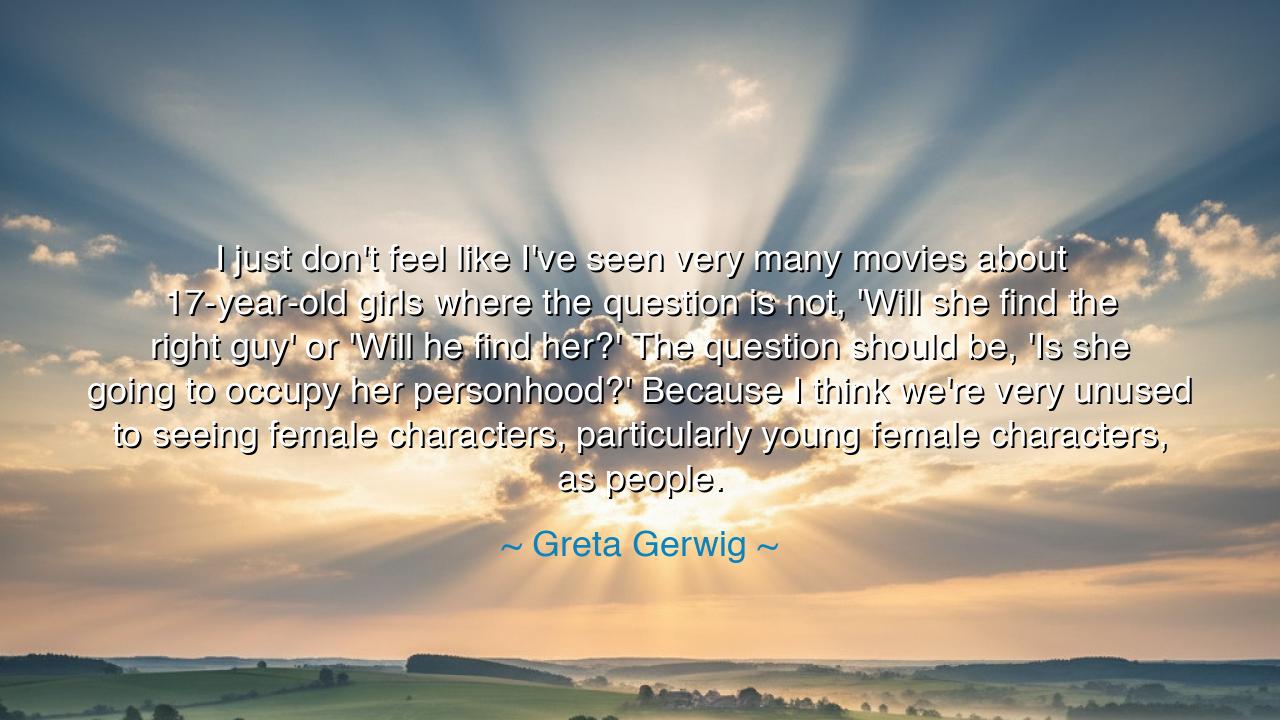
I just don't feel like I've seen very many movies about
I just don't feel like I've seen very many movies about 17-year-old girls where the question is not, 'Will she find the right guy' or 'Will he find her?' The question should be, 'Is she going to occupy her personhood?' Because I think we're very unused to seeing female characters, particularly young female characters, as people.






Come, children of the future, and listen closely to the words of a wise woman who dares to challenge the very foundation of how we see the world. Greta Gerwig, in her profound reflection on the portrayal of women in cinema, once said: "I just don't feel like I've seen very many movies about 17-year-old girls where the question is not, 'Will she find the right guy' or 'Will he find her?' The question should be, 'Is she going to occupy her personhood?' Because I think we're very unused to seeing female characters, particularly young female characters, as people." These words speak to the very heart of a long-standing struggle—the struggle for women, especially young women, to be seen not as objects of desire, but as full, complex human beings with their own agency, desires, and dreams.
In the ancient world, women were often portrayed as mere extensions of the men around them—daughters, wives, mothers—defined not by their own actions or choices, but by their relationships to the men who controlled their lives. Consider the Greek tragedies, where women like Medea or Antigone were often forced into roles of sacrifice or obedience, with their actions driven by the needs of others. In these stories, the woman's identity was secondary, and their purpose was determined by their connection to the men they served. Yet, there were also women who defied this fate—women like Artemisia, the Queen of Halicarnassus, who led her fleet in the Battle of Salamis, and Sappho, the poet whose works spoke of love and life on her own terms. These women, though rare in their time, embodied the personhood that Gerwig speaks of—the right to exist for oneself, to shape one's destiny.
Gerwig’s words challenge the traditional portrayal of young women in film as passive characters whose worth is tied to their relationships with men. She calls for a new narrative, one in which a 17-year-old girl is not defined by her search for love, but by her own journey of self-discovery, her struggles with identity, her ambitions, and her flaws. This idea is revolutionary, for it asks us to rethink how we define womanhood, and to see young women not as future wives or mothers, but as whole individuals with the capacity for greatness, or failure, or growth on their own terms.
Take, for example, the story of Joan of Arc, a young woman who, at the age of 17, defied not only the expectations of society but also the fate of women in her time. Joan did not live for the love of a man, nor did she seek the approval of any authority figure. She was guided by a sense of divine mission, personhood, and identity that transcended the limitations imposed upon her. She became a leader, a warrior, and a symbol of courage and independence, not because she was fighting for the love of a man, but because she had a purpose that was hers alone. In Joan’s story, we see the power of self-determination that Gerwig calls for—the right of a young woman to occupy her own personhood, to define her own narrative, without being reduced to a side character in someone else’s story.
This brings us to the profound lesson in Gerwig’s reflection. Too often, in both life and art, we are presented with women whose lives are framed by their relationships with others—whether as wives, daughters, or lovers—while their individual desires, dreams, and struggles are pushed to the background. It is time to rebalance the story, to see women not as reflections of men, but as whole beings in their own right. Just as Sappho used her poetry to assert her own voice, and Joan of Arc lived out her purpose with unwavering resolve, so too must we allow young women in our society to be seen as individuals whose value and worth are not defined by anyone but themselves.
In your own lives, children, take this wisdom with you: never allow your identity to be defined solely by others’ expectations or by the roles others try to impose on you. Whether you are a young person struggling to understand your place in the world, or an adult trying to navigate the expectations of family, society, or work, always remember that you are a whole person, worthy of respect and self-determination. The path to greatness—in whatever form it may take—lies in owning your story, in living a life true to your own desires and principles.
So, children, let this be your guiding principle: just as the ancients sought to see and define themselves on their own terms, so must we strive for a world where everyone—especially young women—can occupy their personhood fully. Let your life be shaped not by the approval or expectations of others, but by the deep truth of who you are. When you are faced with the story of a young woman—whether in fiction or reality—remember that her worth lies not in who she loves or who loves her, but in who she is, in her choices, her journey, and her self-realization. Only then will we truly see her as a complete person.






AAdministratorAdministrator
Welcome, honored guests. Please leave a comment, we will respond soon